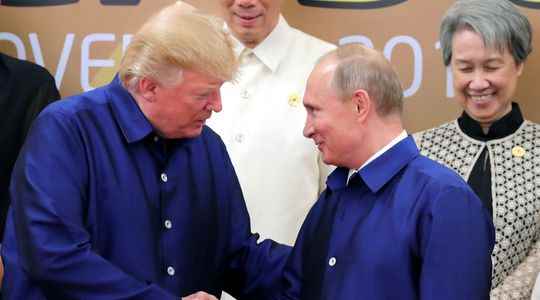Last week, the Republican Party’s annual high mass put many hot topics on the table, from health restrictions to immigration. But, in the midst of the Russian invasion, most conservative speakers carefully avoided addressing the Ukrainian crisis.
For decades, the Republican doctrine in foreign policy has been to promote democracy and make America the policeman of the world in the face of dictatorships. Russia, like the USSR, nicknamed “the evil empire” by Ronald Reagan, was particularly in the sights. But the party has changed. If the arrival of Russian tanks in Ukraine has prompted many Republicans to take sides against Vladimir Putin, some have refused to condemn him and refuse any American intervention.
“Anti-communism and the defense of freedoms were the cement that held the Republican Party together, underlines political consultant Craig Shirley, author of a biography of Ronald Reagan. But today, there is no longer a coherent philosophy on the Russia. You find all kinds of attitudes that are mixed in with domestic politics. If you’re anti-Biden, you have to oppose his foreign policy. In the 1960s, the Republicans did not approve of JFK’s program but they supported him on the Bay of Pigs. Same for Iraq, the majority of Democrats voted for war.”
Trump changed the benchmarks
The dissension within the Republicans owes much to Donald Trump, who jostled the orthodoxy of the party. The billionaire, who campaigned on the slogan “America First” (America first), has repeatedly threatened to leave NATO, and has continued to sing the praises of dictators, including Vladimir Putin: Russia and autocracies have become “symbols of American conservatism”, observes Emily Tamkin, the author of a book on George Soros, in the New York Times : “Many admirers of the current autocrats on the American right seem to believe that the countries they lead are models of ‘whiteness’ [whiteness en anglais, NDLR]Christianity and conservative values.”
Even on the eve of the war, Donald Trump continued to praise Putin, calling him “clever” and “shrewd”. Recognizing the independence of the two separatist regions in eastern Ukraine is a stroke of “genius”, he enthused. Ronald Reagan must be rolling over in his grave… On TV sets, Trump’s allies, like Tucker Carlson, the very popular host of a political program on FoxNews, initially minimized the danger. It would only be a vulgar “border dispute”, he announced just before the invasion. “The Democrats in Washington have told you it’s your patriotic duty to hate Vladimir Putin,” he added.
The next day, Tucker Carlson claimed that Ukraine was a puppet, “essentially run by the State Department [américain]”, repeating there the vocabulary of Moscow. Other Trumpists like JD Vance, a candidate for the Senate in Ohio, felt that the United States should not interfere in the conflict. “I do not care enough what happens going on in Ukraine,” he said, lamenting that US leaders “are more interested in the Ukrainian border than ours.”
On Ukraine, a change of course for Republican voters
But in Congress, elected Republicans, who usually unite with the former president, have adopted a much more hawkish attitude in supporting sanctions against Russia. This invasion is “irresponsible” and “dangerous”, summarized Kevin McCarthy, the leader of the Republicans in the House, and should “lead to serious consequences”. At the same time, American public opinion has undergone a striking shift. According to a Yahoo News-YouGov poll, 57% of Americans say they side with Ukraine against 25% inclined to neutrality. The same poll three weeks ago showed an opinion roughly evenly divided between 46% in favor of Ukraine and 49% for neutrality. It is the Republicans who have changed course the most.
As the bombing intensified, the Trumpist wing watered down its wine. JD Vance, the Ohio candidate, acknowledged that Russia’s attack was “unquestionably a tragedy”. Tucker Carlson, on the other hand, turned his jacket around and said in front of his listeners: Putin “clearly deserves to be punished”. Mike Pompeo, Trump’s ex-secretary of state, after claiming “enormous respect” for Putin, a “very talented statesman” and “elegantly sophisticated”, called him “evil” and ” autocrat”.
As for Trump, he claimed he was misunderstood and condemned the invasion as “an atrocity that should never have been allowed to happen”, though he did not go so far as to criticize his Russian pal. “The problem is not that Putin is smart, of course he is. The real problem is that our leaders are stupid.”
But the Republican Party remains divided on the strategy to follow, torn between an interventionist establishment and a base which, after the endless wars in Afghanistan and Iraq, has little taste for military adventures. “There has always been an isolationist current among Republicans, but it grew after the hangover in Iraq and the passage of Trump,” continues Craig Shirley. The only thing that unites Republicans is the attacks on Joe Biden. They keep accusing him of softness, saying that his lack of firmness encouraged Putin. Michael McCaul, representative of Texas, compared him to Neville Chamberlain in 1938. Their criticisms hit the bull’s eye if the same poll is to be believed. Trump voters have a more favorable view of Vladimir Putin than of Joe Biden!
